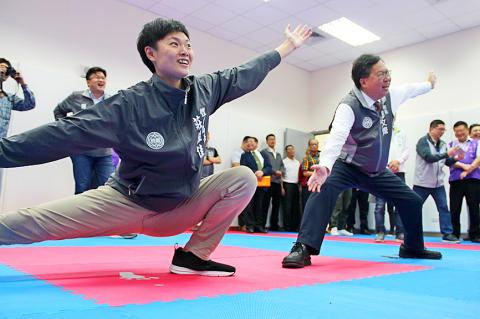The Chinese Taipei Olympic Committee yesterday published a list of 11 Taiwanese athletes who would be temporarily banned from participating in world sports events after testing positive for performance-enhancing drugs.
In a letter dated March 6, the World Anti-Doping Agency (WADA) asked the committee to make public the list of contravening athletes and the duration of their ban before Friday next week.
Two-time weightlifting champion Hsu Shu-ching (許淑淨) was listed among the offenders, while Lin Tsu-chi (林子琦), already banned for testing positive during the 2016 Rio de Janeiro Summer Olympics, is under a six-year ban for a repeat offense.

Photo: Hsu Cho-hsun, Taipei Times
Others on the list are Chen Pin-sheng (陳品升), Yang Fu-chieh (楊富傑), Yeh Mu-han (葉慕涵) and Chen Kung-wen (陳孔文) in the bodybuilding category, as well as Chen Shih-hao (陳士豪), Chang Yu-hsi (張有錫), Chiang Kai-chieh (江凱傑) and Huang Lung-hsing (黃龍興) in the powerlifting category.
Wu Chou-wei (吳宙威), a hammer thrower, is also on the list.
While former Taekwondo athlete Chuang Chia-chia (莊佳佳), the director of the Taoyuan Department of Sports, is not on the list, allegations emerged yesterday that she has been banned from participating in sports events for failing to report to the WADA about her whereabouts in 2017.
Chuang confirmed the allegations, saying a petition has been filed, but added that the ban was not related to the use of performance-enhancing drugs.
Sports Administration Director-General Kao Chin-hsung (高俊雄) said that the agency would convene a meeting within two weeks to determine whether it would demand that Hsu return her salary as a coach at the National Sports Training Center in Kaohsiung during the time she was banned, which began in January last year.
Hsu has already resigned as a center coach.
Pundits have said that Hsu’s defense of “accidental ingestion” of the drug as weak, as both she and Lin tested positive for the same substance.
The agency will also re-evaluate the suitability of coach Tsai Wen-yee (蔡溫義), Kao said.
Kao pledged that a final decision would be made prior to April 15 on whether Tsai would be allowed to stay on as a coach.
The agency is also mulling whether to establish a separate drug-testing unit, which is currently handled by the Chinese Taipei Olympic Committee, he said, adding that a review of extant regulations would be required.
The agency is focused foremost on the protection of athletes’ right to participate in sports events, but this focus must be tempered by observation of international regulations, Kao said.
Additional reporting by CNA

Nipah virus infection is to be officially listed as a category 5 notifiable infectious disease in Taiwan in March, while clinical treatment guidelines are being formulated, the Centers for Disease Control (CDC) said yesterday. With Nipah infections being reported in other countries and considering its relatively high fatality rate, the centers on Jan. 16 announced that it would be listed as a notifiable infectious disease to bolster the nation’s systematic early warning system and increase public awareness, the CDC said. Bangladesh reported four fatal cases last year in separate districts, with three linked to raw date palm sap consumption, CDC Epidemic Intelligence

Two Taiwanese prosecutors were questioned by Chinese security personnel at their hotel during a trip to China’s Henan Province this month, the Mainland Affairs Council (MAC) said yesterday. The officers had personal information on the prosecutors, including “when they were assigned to their posts, their work locations and job titles,” MAC Deputy Minister and spokesman Liang Wen-chieh (梁文傑) said. On top of asking about their agencies and positions, the officers also questioned the prosecutors about the Cross-Strait Joint Crime-Fighting and Judicial Mutual Assistance Agreement, a pact that serves as the framework for Taiwan-China cooperation on combating crime and providing judicial assistance, Liang

The manufacture of the remaining 28 M1A2T Abrams tanks Taiwan purchased from the US has recently been completed, and they are expected to be delivered within the next one to two months, a source said yesterday. The Ministry of National Defense is arranging cargo ships to transport the tanks to Taiwan as soon as possible, said the source, who is familiar with the matter. The estimated arrival time ranges from late this month to early next month, the source said. The 28 Abrams tanks make up the third and final batch of a total of 108 tanks, valued at about NT$40.5 billion

Reports of Taiwanese going missing, being detained or interrogated, or having their personal liberties restricted in China increased about fourfold annually last year, the Mainland Affairs Council (MAC) said yesterday. Last year, 221 Taiwanese who traveled to China were reported missing, were detained and interrogated, or otherwise had their personal freedom restricted, up from 55 the previous year, the council said. Reopening group tours to China would be risky, as it would leave travelers with no way to seek help through official channels after Beijing shut down dialogue between the associations tasked with handling cross-strait tourism, the MAC said. Taipei’s Taiwan Strait Tourism